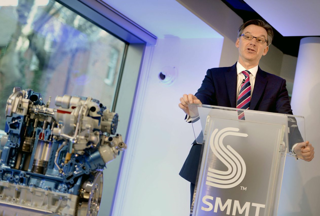A third of UK automotive businesses are already cutting jobs ahead of Brexit and 79.6% have expressed concerns about the split’s effect on their future profitability, according to the findings of an SMMT survey.
The Society of Motor Manufacturers and Traders has today (October 15) published the results of a survey revealing the escalating fears of an industry dependent on free and frictionless trade with the EU, which chief executive, Mike Hawes, said “reveals the bleak future that awaits this vital sector in the event of ‘no deal’”.
The survey of 158 SMMT member companies, who completed an online poll, found that in three UK automotive businesses is already cutting jobs, up from one in eight when the survey was last carried out in November 2018.
Four-fifths (80.3%) fear leaving the EU without a deal will have negative consequences for their future prospects (up from 74.1% 10 months ago), meanwhile, as virtually the same number (79.6%) are worried about the impact on their profitability.
Two-thirds (62.2%) of respondents said that a ‘no deal’ Brexit would impact their ability to win overseas business and a similar number stated that they will be unable to invest in their UK operations.
The findings come less than a month after Hawes joined with other European automotive leaders to unite against ‘no deal’ Brexit.
Hawes said: “As the Brexit clock ticks ever closer to midnight, this survey reveals the bleak future that awaits this vital sector in the event of ‘no deal’.
“Damage has already been done: investment is haemorrhaging competitiveness being undermined, UK jobs cut and vast sums wasted on the impossibility of preparing for ‘no deal’.
“Make no mistake, every day ‘no deal’ remains a possibility is another day of lost investment, another day that makes it harder to recover investor confidence in the UK.”
He added: “As yet, the damage is not irreversible. But we need a deal. A deal that, in the short term, enables a ‘business as usual’ transition for as long as it takes to negotiate and implement the future trading relationship.
“In the longer term, that deal must replicate all of the benefits we currently enjoy which means an ambitious deal that delivers free and frictionless trade.
“UK jobs, innovation, trading strength and economic growth all depend on the automotive sector so we urge all parties to get a good deal done before it is too late.”
The SMMT said it had uncovered evidence that the mere threat of ‘no deal’ had already hurt the UK, with 11.8% of firms stating that they had already divested from their UK-based operations and 13.4% are relocating operations overseas.
Overall, three quarters (77.2%) of firms say that there has already been a negative impact on business even before the UK has left the EU.
The industry has also taken considerable steps to prepare for the possibility of ‘no deal’, with the vast majority (73.2%) actively preparing for post-Brexit disruption.
Almost half have spent money on stockpiling and warehousing to mitigate against the risk of border delays and production stoppage and SMMT’s 2019 UK Automotive Trade Report calculates that a ‘no deal’ Brexit would knock £50,000 a minute off the sector’s economic contribution.
A third of the businesses surveyed told the SMMT that they had made adjustments to logistics and shipping routes, and 26.8% have been forced to invest hard-won profits in new customs infrastructure, despite a recognition that such systems cannot guarantee against border delays in the event of ‘no deal’.
The SMMT said that separate research had already shown that some of the UK’s biggest automotive manufacturers have spent more than £500m in an attempt to mitigate at least some of the risks of a ‘no deal’ scenario.
In June AM reported on SMMT assertions that a 'no deal' Brexit could cost car industry £70m per day.
It added: “The industry cannot, however, fully prepare for all the uncertainties and many will not survive the application of a 10% tariff on finished vehicles as they already operate on wafer-thin margins.
“At a time when the global automotive industry is striving to develop ever safer, cleaner and more advanced technology, manufacturers in the UK are being forced to waste money on ‘no deal’ survival measures.”



















Login to comment
Comments
No comments have been made yet.